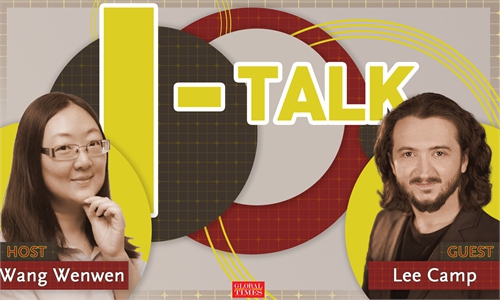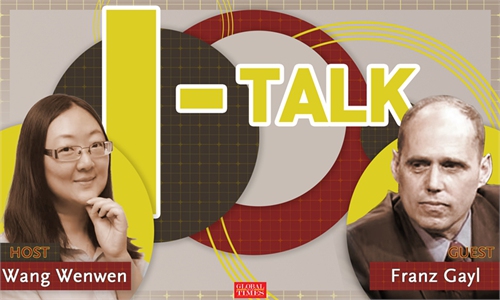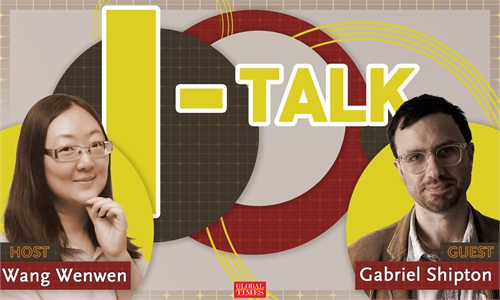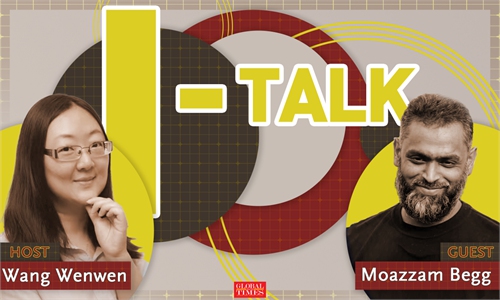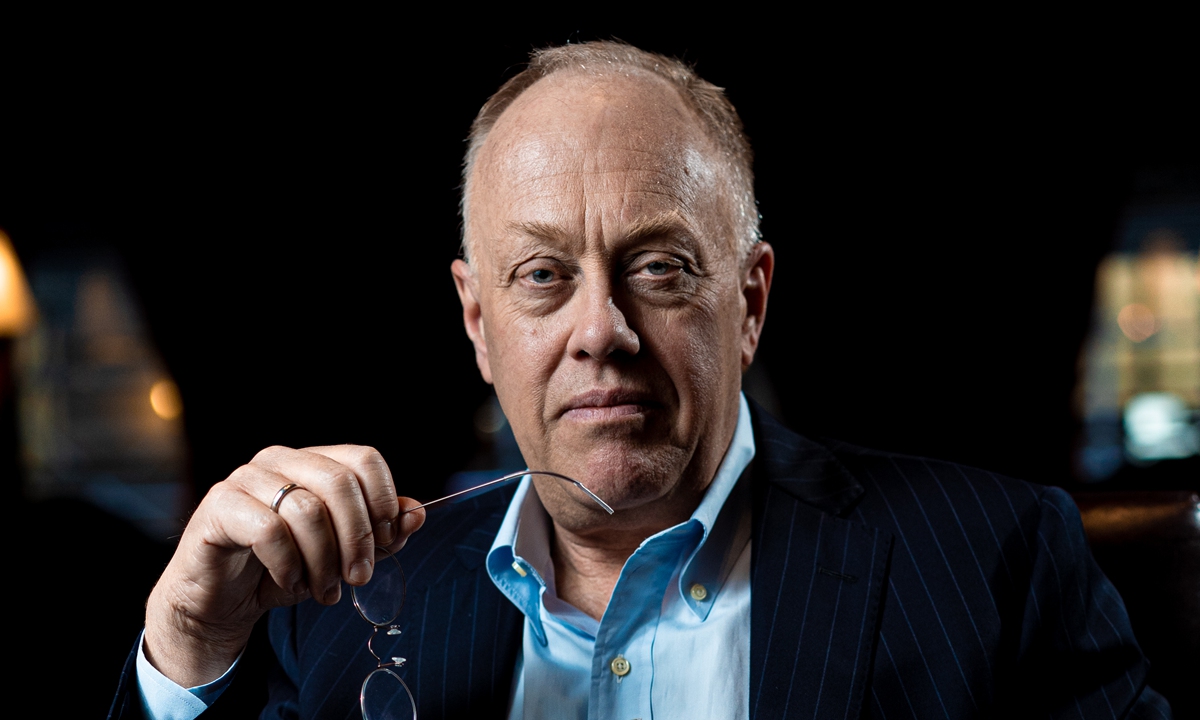
Chris Hedges Photo: Courtesy of Hedges
As the Ukraine conflict goes on, the US has escalated its censorship of speech. Among those censored is Chris Hedges (Hedges), a Pulitzer Prize-winning journalist and a former host for RT America. Coincidentally, he left the New York Times 17 years ago due to his vocal opposition to the Iraq War. What can be told from his experiences of working for both a US and Russian media outlet? Why are anti-war and anti-imperialist voices like his marginalized in US society? Global Times (GT) reporter Wang Wenwen talked to Hedges about these issues.Reprimanded by the New York Times for opposing Iraq war
GT: In early March, RT America was shut down and laid off staff like you and other colleagues. Did you expect such a scenario?
Hedges: I did expect such a scenario as soon as I read the 2017 Director of National Intelligence report. It was clear that RT was a target. I also watched [James] Clapper, the director of national intelligence, as he testified before Congress. When he spoke about RT he was clearly enraged. Seven pages of that report, which was about supposed Russian interference in the elections of 2016, were dedicated to RT. Those seven pages explained why they didn't like RT. While they accused RT of Russian propaganda, all of the examples they cited had nothing to do with Russian propaganda. It had to do with giving a voice to occupy activists, anti-fracking activists, third party candidates, and Black Lives Matter activists. That's why they went after it. They were waiting for the moment when they could shut it down for that reason. Putin's invasion of Ukraine gave them the opportunity they were waiting for.
Critics such as myself have been pushed very far to the margins, especially if you are as critical as I am of the Democratic Party. I'm a supporter of the Boycott, Divestment and Sanctions movement against Israel. Those two things are enough to get you pushed aside.
RT gave space to American critics who were denied space elsewhere. We don't know the official reason it was shut down, because Google which owns YouTube never told us. These social media platforms are completely opaque. They engage and censor without ever explaining or even giving notice to those they censor.
So one day 300+ shows were on YouTube and the next day they were all gone, but who made the decision? Why was the decision made? It's not made public.
GT: In 2005, you left the New York Times because of your opposition to the Iraq War. Can you briefly tell me your experience?
Hedges: At the time, I had been the Middle East bureau chief. I had spent 7 years in the Middle East. I'm an Arabic speaker. I was very outspoken against occupation, invasion of Iraq and Afghanistan and everywhere else for all the reasons that are now apparent. I think anybody who had any experience in the region understood that this was a debacle, and yet the hysteria, especially after 911, made any kind of discussion, even a discussion by those of us who had years of experience in the region impossible.
So, I was finally booed off of a commencement stage in Rockford Illinois. And then the right-wing media grabbed that incident and engaged in daily, hourly character assassination. The newspaper gave me a formal written reprimand. Under union or guild rules, you give the employee a reprimand for a particular activity. And then if they engage in that activity again, under union rules they can be fired. I left before I was fired, but my career was finished. I would go into the New York Times office, and the message bank on my phone would be filled with death threats. I was speaking about a reality that I understood very well, but you couldn't question the sacred cause, championed by George W. Bush. The media was the worst cheerleader for war.
GT: From being a reporter for the New York Times to joining the US branch of Russian media, was this shift easy for you?
Hedges: Yeah, because I did what I have always done. First of all, that show had been on TeleSur and then TeleSur had lost its funding. RT approached me about putting the same show on RT. It's a show where I primarily interview authors. 75 percent of my shows are about books. I also interview intellectuals like Cornel West, Noam Chomsky, and others.
But it's primarily about books. I don't have a television. I'm a reader. I was very conscientious about reading the books of those I interviewed. I'm an author. I've written 14 books. So, I don't like to be interviewed by people who haven't read the book and most of them don't. I put a lot of time and effort into the show. It's a kind of show that should be on public broadcasting if we had a functioning public broadcasting system.
That's what I think is so egregious, that all of those shows are gone, and none of them had anything to do with Russia. But many of them gave a voice to authors and critics of corporate capitalism and US imperialism. And that, of course, is why it's gone. They knew what they were doing.
GT: Did RT tell you what to do? In which media do you feel you can speak out the truth more?
Hedges: I denounced Putin's invasion of Ukraine. RT went dark 6 days later. I can't imagine Moscow would have looked at that very favorably on my denunciation, but I will say, at least for those 6 days, they never said a word. They were certainly aware of it. Complete editorial control was the condition that I kind of set down when RT approached me about doing the TeleSur show on RT. I initially said no, but they promised editorial freedom and they were true to their word.
GT: What is the biggest difference between working for the New York Times and RT?
Hedges: There's a big difference because, in the show, it was an exchange of opinions. I was a news reporter. There are very strict rules in American journalism about how to report the news. You have to work within those narrow confines. I wasn't an opinion writer for the Times. I spent a lot of time, for instance, in Gaza. The Israelis would bomb Gaza often with fighter jets. I would go to the place they bombed. I would report the damage. It was newsgathering. It was different from what I did on RT. When I began to speak publicly about the folly of invading Iraq, I was stepping outside of my role as a reporter. I was aware of that and the consequences. It's a very different kind of job.
GT: The entire archive of six years of your show On Contact for RT America has just been removed by YouTube. You believed it was done supposedly "in the name of censoring Russian propaganda." Can you further elaborate?
Hedges: They know it is not Russian propaganda. We rarely mentioned Russia or Putin, and the few times we did it was not in flattering terms. It's much more pernicious than that. RT gave a platform to a critic such as myself. We know from the director of the national intelligence report, as well as the testimony that Clapper gave before Congress, why they didn't like RT. It was a show that gave a voice to critics of the United States ruling class and the US empire. They knew I was not disseminating Russian propaganda, unless critiquing the ills of American society serves Russia's interest. To an extent it does. That's of course why RT gave me a show. But in a functioning democracy with a free press, that is the precise role of the press. We're not propagandists. The government has enough propagandists.
'Most Americans think NATO is defensive. That's laughable'
GT: You are anti-war and anti-imperialist. How are such voices marginalized in US society? And why do you think they are important today?
Hedges: I spent 20 years on the outer reach of the empire as a foreign correspondent. I'm intimately familiar with the crimes of empire. I've had to report on them. Those crimes are visceral. And with the decline of foreign reporting and the decay within American news, we don't often hear voices outside the United States. For instance, I think most Americans think NATO is a defensive organization. That's laughable to anyone in the Middle East. They understand that NATO is a very aggressive force, which has expanded, of course, up to the borders virtually with Russia, breaking the promise that the Reagan administration, Margaret Thatcher, and the German government all gave to Gorbachev not to extend beyond the borders of a unified Germany.
And then the Clinton administration promised they wouldn't station NATO troops in Central Europe or Eastern Europe. Now we have thousands of NATO troops in central and eastern Europe. That's lost on the American public. I blame the press for much of that.
GT: You said you will produce a show and a column a week at Substack. Are you expecting any intervention from the US government?
Hedges: Ultimately yes. As things decay in the United States, they will be less and less tolerant of critics. They know who the targets are. You already have a campaign to shut down Substack. The Biden administration has not responded to the very legitimate grievances of the working class. It has not fulfilled even its most basic campaign promises, like raising the minimum wage to $15 an hour or forgiving student deb. Its Build Back Better bill is gutted. All of the supplemental help that was put out by the Trump administration - the child tax credits, the $600 supplement to unemployment benefits, the $2,000 checks, the moratoriums on bank closures and bank repossessions, all of that's ended. And we're hit with about 7-percent inflation.
Things are getting worse. The paralysis within the ruling elites will result in them being more censorious towards the critics, as if that will make the problem go away.
GT: Can a Republican government do better?
Hedges: No. The Republican Party is also beholden to corporate interests. The difference is that if the Republicans come back in power they will carry out acts of vengeance. It will be a very vengeful administration, whether it's Trump or somebody like Trump. That's because the Democrats have been very vengeful in terms of, for instance, blocking Trump out of his Twitter account social media, which I opposed. Once you give these huge digital media platforms the power to censor, I knew they wouldn't stop with Trump. I had no idea I would be one of next ones on the list. There will be a great deal of vengeance, but both sides are culpable. What you have is the establishment Democratic hierarchy and the old establishment Republican hierarchy, people like Liz Cheney and Mitt Romney, working together against the cultish Republican voters who support Trump. They are not responding to the systemic issues that resulted in the rise of these political deformities but to silence people such as myself who are speaking about these issues. That's ultimately very self-defeating.
'They want to create another Chechnya or Afghanistan'
GT: What do you think of the US government and media narrative that describes the current Russia-Ukraine conflict as a "democracy vs autocracy" battle?
Hedges: Every time we go to war, like with Iraq, whomever they were fighting, whether Saddam Hussein or Vladimir Putin, the enemy becomes the new Hitler. It's childish. There's a very cynical game being played here, so they're pumping staggering amounts of weapons into Ukraine and training Ukrainian troops in Poland, because they want to create a quagmire. They want to create another Chechnya or the old Afghanistan where Brzezinski, who was Carter's national security adviser, began funding and arming the groups that would become the Taliban and weaken the communist government in Kabul to lure the Soviets into Afghanistan.
You're seeing a very similar policy in Ukraine. The idea is to make Russia bleed, but the people who will truly bleed are the Ukrainians. That's the policy - when you keep bringing in that level of weaponry and arms, then there's no incentive on the part of the Ukrainians to negotiate any kind of a peace deal. I don't know whether Putin wants one or not, but there's certainly no incentive on the Ukrainian side.
Is Ukraine a democracy? I've never been to Ukraine, but I've certainly read quite a bit about it. It's pretty high on the index of corruption, certainly has some very vocal neo-Nazi elements and maliciousness within it. I covered war for a long time. The world doesn't bifurcate between good and evil. That's a kind of cartoon vision, although it's one that the US media is feeding to the public.
GT: Recently, Russian President Vladimir Putin criticized the West's "cancel culture". We also see the US Russian media and US social media giants leave Russia. How does this "cancel Russia" act contradict US freedom of speech and how will it affect the war?
Hedges: It's infantile. Go back to the first Gulf War, because the French didn't support the war. French fries became freedom fries. I was working in Paris. I covered al Qaida out of Paris in Europe and the Middle East. I worked closely with French Intelligence. But even within the New York Times, it was acceptable to make jokes about the French. The disease of nationalism is about self-exaltation. It's why people like it. But the flip side of nationalism is always racism. You're seeing that in terms of the way they denigrate Putin and denigrate Russia. We saw the same thing in the Gulf War when people were also openly expressing racist comments to the French because they didn't support the war.
That's what happens in wartime. There's a national camaraderie that exists when you have a real or imagined foe, who is always dehumanized the other. It is very disturbing, but that's certainly what's taking place.
I was a foreign correspondent for a long time. Ny job was to be linguistically, culturally, historically, and religiously literate, to explain how other people thought, to explain why they felt the way they felt.
Russia has very legitimate grievances. Much of their country was destroyed in the middle of the 20th century by the Nazi invasion and occupation. They are quite cognizant that NATO, as people are in the Middle East, is an aggressive entity. It's not a defensive entity. You see it with Taiwan and the South China Sea, provoking China. We don't have many foreign bureaus anymore. We don't have many foreign correspondence anymore. The United States has become even more insular. We have to understand how other people view us, why they think the way they do, if we're ever going to build any kind of a real conversation. But if we just demonize people and elevate ourselves as a kind of moral arbiter of the world, we're only going to perpetuate conflict.
GT: You went to attend Julian Assange and his fiancée's wedding in London last week. He is very likely to be extradited to the US. Are you worried about his fate?
Hedges: It does appear that all of the forces in the UK have coalesced around his extradition. UC Global did, which is the security firm in the Ecuador embassy, which worked on behalf of the CIA, recorded all the conversations between Julian and his attorneys. This is a violation of attorney-client privilege. That fact alone should have seen the case thrown in a functioning judicial system. But this is burlesque.
The goal is to destroy him psychologically, and perhaps physically. He's in very poor shape. He had a small stroke last October. He has had psychological breakdowns. This is all intentional.
GT: Are you worried about your future and your safety?
Hedges: I know the cost. It is one I am willing to pay. It is the price of integrity. I wasn't surprised when they shut down RT. That doesn't take away the emotional impact of suddenly having it gone and starting all over, building from zero at Substack.
I don't like being proven right. But I can't say this is a surprise. The goal is to silence, especially as things deteriorate, voices like mine completely. My goal is to fight back as hard as I can.

